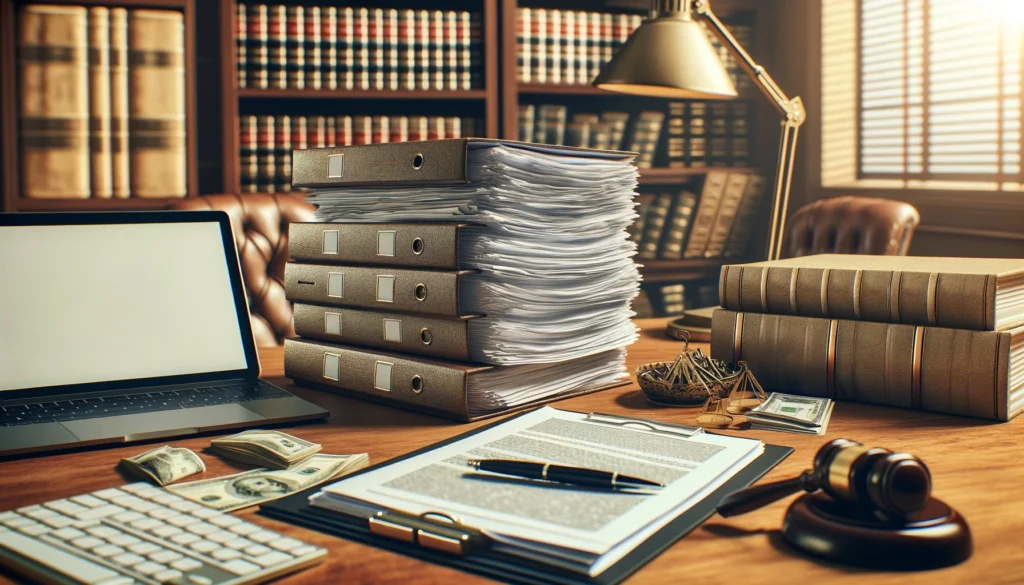
“`html
The Role of AI in Modern Legal Work
The infusion of artificial intelligence (AI) into legal work has revolutionized the industry, enabling unprecedented efficiency and precision. As legal technology evolves, AI tools like ChatGPT have emerged as game-changers, automating routine tasks and streamlining complex processes.
Historically, the legal sector has been slow to adopt new technologies. However, recent advancements in AI have changed the landscape dramatically. From contract analysis to legal research, AI is transforming the way legal professionals operate, reducing the time and effort required for various tasks.
For paralegals, this evolution means a significant reduction in bottlenecks, allowing them to focus on more strategic and high-value work. The potential for efficiency gains is immense, particularly in areas like personal injury claim subrogation, where accuracy and speed are crucial.
Understanding Subrogation in Personal Injury Claims
Subrogation is a fundamental concept in personal injury claims, referring to an insurer’s right to pursue a third party that caused an insurance loss to the insured. Essentially, it allows the insurer to step into the shoes of the insured to recover the funds paid out on the claim.
This process, while straightforward in theory, often presents several challenges for paralegals. Common hurdles include tracking down relevant information, coordinating with multiple parties, and ensuring compliance with deadlines and legal standards.
Speed is of the essence in subrogation. Delays can lead to missed recovery opportunities, and errors can result in costly litigation. Therefore, streamlining the subrogation process is not just beneficial but critical for legal practices.
Also read:
Harnessing ChatGPT for Legal Precision
Given the complexities involved, ChatGPT stands out as a powerful tool for enhancing precision and efficiency in legal tasks. By harnessing its capabilities, paralegals can significantly improve their workflow, particularly in handling subrogation duties.
To optimize ChatGPT for legal purposes, preparation is key. Start by setting up access to the platform and familiarizing yourself with its functionalities. Ensure you have clear objectives for what you want to achieve with AI assistance.
- Initial Prompt Example 1: “Provide a general overview of the subrogation process in personal injury claims and cite relevant statutes.”
- Initial Prompt Example 2: “Draft a standard notice of subrogation to be sent to a third-party insurer.”
These initial prompts can help set the stage and generate content that is relevant and precise. However, the real power of ChatGPT lies in crafting more refined and specific prompts.
Also read:
Crafting Nuanced Prompts for Accuracy
Effective use of ChatGPT hinges on the quality of the prompts. An effective prompt should be clear, specific, and comprehensive. This ensures that the output is aligned with your requirements and reduces the need for extensive revisions.
The Anatomy of an Effective Prompt: Break down your request into manageable components, specify the context, and include any relevant details.
For instance:
- Specific Prompt Example 1: “Draft a letter to an insured client explaining the subrogation process, including the steps involved and their rights and obligations.”
- Specific Prompt Example 2: “Generate a list of potential defenses a third party may raise against a subrogation claim in a personal injury case.”
By being specific, you avoid vague responses and obtain accurate, actionable information that streamlines your subrogation tasks.
Also read:
Advanced Techniques for Maximizing Efficiency
ChatGPT can handle more than just basic drafting. Advanced techniques can further enhance efficiency in legal practices.
- Automating Routine Tasks: Utilize ChatGPT to draft routine correspondence and documentation. For example, “Generate a standard request for medical records in a personal injury subrogation case.”
- Data Extraction: Use AI to extract critical information from large datasets effortlessly. Prompt example: “Extract key details from this list of medical reports for subrogation purposes.”
- Legal Research: Streamline your research by using ChatGPT to find relevant case law and statutes. For example, “Identify recent case law that discusses the equitable lien doctrine in subrogation claims.”
Implementing these techniques can significantly reduce the time spent on repetitive tasks, allowing paralegals to focus on more complex and strategic work.
Also read:
Practical Tips for Implementation
Integrating ChatGPT into your daily workflow requires a thoughtful approach.
- Integration into Workflow: Develop strategies for incorporating AI tools into your routine tasks, ensuring a seamless workflow.
- Quality Control: Always review and verify the AI-generated output to ensure it meets legal standards and is accurate.
- Continuous Learning: Stay updated with the latest AI advancements and continually optimize your prompts for better results.
With these tips, you can effectively leverage ChatGPT to enhance your subrogation processes and overall legal practice.
Also read:
Ethical Considerations and Best Practices
While AI tools offer numerous benefits, it’s essential to understand their ethical implications.
- Ethical Boundaries: Recognize the limitations of AI and ensure it is used responsibly within the legal framework.
- Confidentiality: Safeguard client information and ensure all AI interactions comply with confidentiality standards.
- Compliance: Ensure that all AI-generated work adheres to legal standards and regulations.
Adhering to these best practices ensures ethical and effective use of AI in legal work.
Future Outlook: The Next Frontier in Legal Tech
The future of AI in the legal industry looks promising, with emerging trends set to transform traditional practices.
As technology continues to evolve, staying ahead of advancements will be crucial for paralegals and legal professionals. Embracing change and continuously adapting to new tools will be essential for maintaining a competitive edge.
Also read:
Conclusion: The Efficiency Dividend
In conclusion, leveraging ChatGPT for subrogation tasks in personal injury claims offers significant efficiency gains. By crafting effective prompts, automating routine tasks, and integrating AI into daily workflows, paralegals can streamline their processes and enhance their productivity.
We encourage paralegals to explore and adopt these AI tools, embracing the broader impact of AI on the legal profession. The efficiency dividend is clear: a more streamlined, precise, and effective legal practice.
“`


